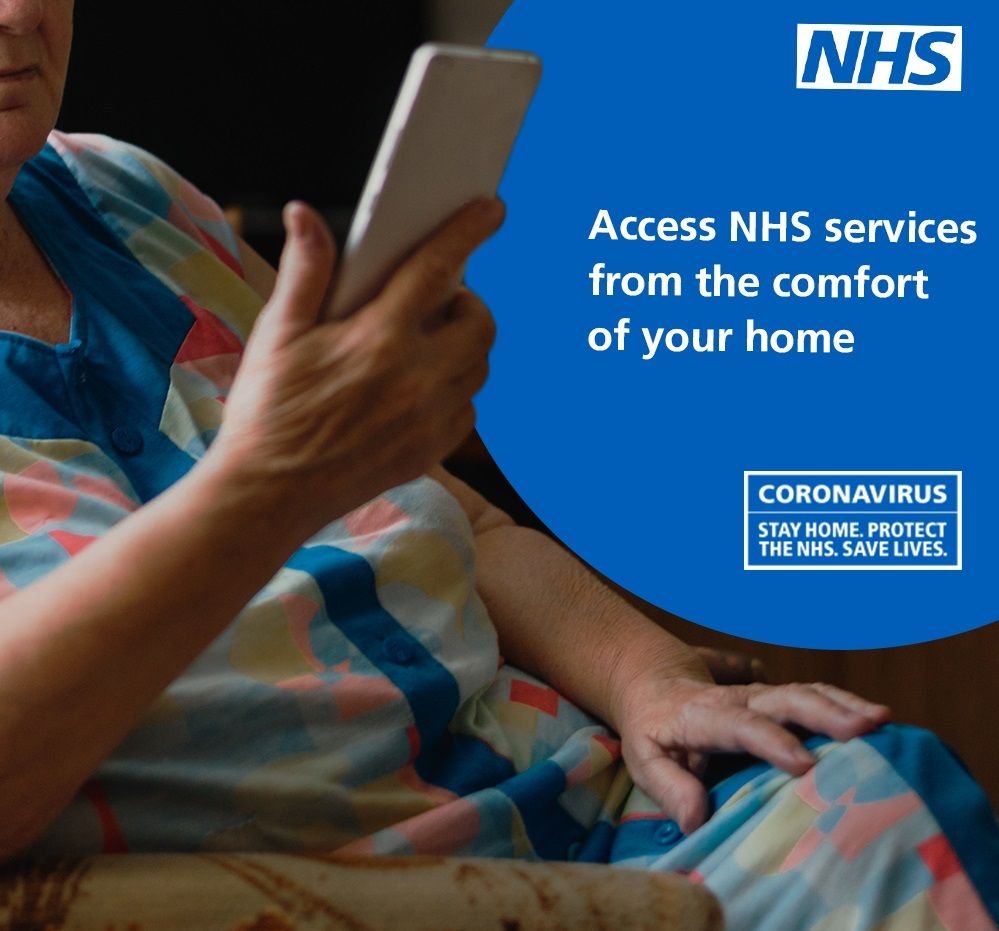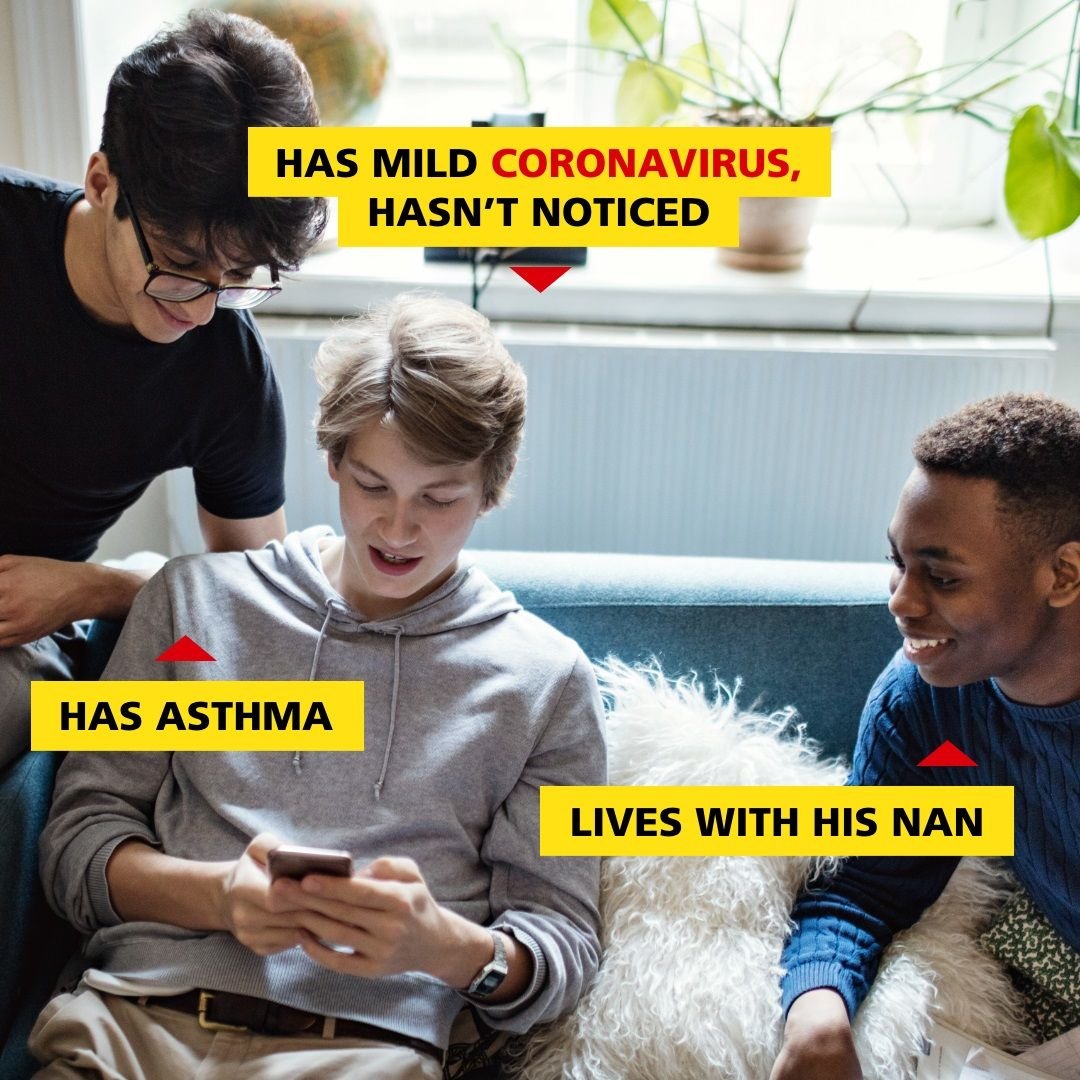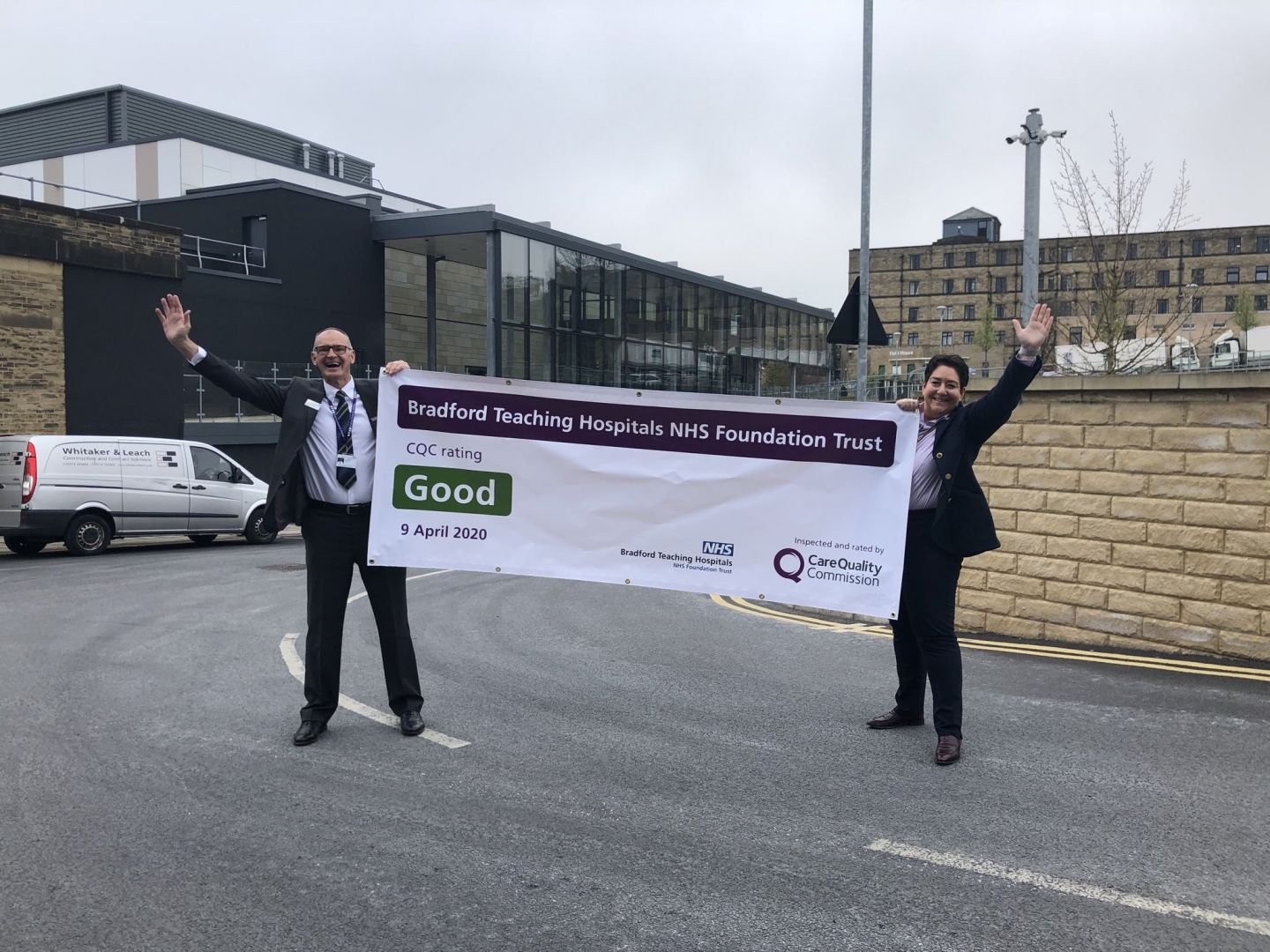Posted on: 17 April 2020
Hello my name is Rob
Our Partnership was founded on the ambition of making sure we improve outcomes for all people across West Yorkshire and Harrogate. This remains true during these times of the Covid-19 pandemic. The infrastructure we have in place puts us in a good position to respond as more details become available about this novel virus.
In the last weeks we have started to see how the disease impacts upon different populations. Clearly there is an age related factor to the risks associated with the disease. This was expected. What has been less expected is the disproportionate impact on men and the emergent evidence on BAME communities.
The early research from The Intensive Care National Audit and Research Centre showed the median age of those in a critical condition of all ethnicities was 61 and that almost three quarters were men. It also found from the first patients critically ill with Covid-19 in UK hospitals that 35% of almost 2,000 of people were non-white, nearly triple the 13% proportion in the UK population as a whole. The study is thought to be the first analysis of its kind anywhere in the world looking at the ethnic breakdown of cases of the virus. Clearly, more research in this area is needed.
A BMG poll for the Independent suggest that ethnic minorities and young people are also taking a disproportionate financial and employment hit from the coronavirus pandemic. This makes the work of the Partnership’s BAME network even more important now and post-COVID. Our BAME networks are meeting next week; our organisations are looking at their data and our public health colleagues are tracking the impact of this virus. We will keep this in focus. The measure of our Partnership’s success will be our ability to meet the needs of all population, using the evidence and good practice.
Here in West Yorkshire and Harrogate we have a set of programmes which are interdependent to an even greater extent than many of us realised. The challenge when this is over will be capturing that in the most practical of ways to drive through our approach to realise our ‘Better health and wellbeing for everyone: Our five year plan’ ambitions – in which tackling health inequalities is key to everything we do.
We will shortly launch our grant funding to help reduce the gap in health equalities across the area. This will focus on voluntary and community organisations to help tackle the impact on people’s health affected by COVID-19. In particular, we will be looking for innovative and sustainable community support for people who are worst affected by the impact of the pandemic. For example those who live alone and cannot access social activities, people whose mental health and financial circumstances have changed significantly due to the pandemic.
For now, everyone is focused rightly on immediate challenges and the current position we find ourselves in is far from over. In many ways the impact on people’s lives is yet to be fully realised in areas such as domestic abuse, where staying home brings with it more misery and fear. Shocking statistics revealed last week by The UK’s largest domestic abuse charity, Refuge, has reported a 700% increase in calls to its helpline in a single day, while a separate helpline for perpetrators of domestic abuse seeking help to change their behaviour received 25% more calls after the start of the Covid-19 lockdown. Lockdown doesn't automatically make some people safe and we need to be open and honest about this.
Last week the Home Secretary Priti Patel launched a public awareness campaign, backed by £2m of funding, to help victims of domestic abuse during the coronavirus lockdown. The funding will be provided to charities and the Domestic Abuse Commissioner to support helplines and online support. The campaign, launched with the hashtag #YouAreNotAlone, seeks to reassure those affected by domestic abuse that support services are still available during the lockdown. To those experiencing domestic abuse – there is a Freephone National Domestic Abuse Helpline open 24 hours a day (0808 2000 247). If you’re in a situation where you can’t speak, ring 999 and when they answer press 55. This tells them you need help but can’t speak. They will dispatch police to you.
Our improving population health management programme is working hard with colleagues from public health and many others to look at how they can tackle health inequalities and support victims of abuse and violence during the pandemic and post-COVID 19. They are continuing to support the work of the West Yorkshire Violence Reduction Unit (VRU) and their response strategy and delivery plans.
We are working to embed a public health approach and evaluation tool for all programmes of work and delivery projects and are supporting the VRU to adapt provision to continue as much as possible during COVID-19 and social distancing.
This includes working with the VRU and Yorkshire Ambulance Service (YAS) to develop a network for West Yorkshire to look at changes in violence in relation to COVID-19. This network will be a partnership with existing groups in West Yorkshire, VCS and the Police. It will potentially include:
- Increase in domestic abuse
- Inter -familial sexual / physical abuse
- Exploitation of young people
- Increase in childhood trauma and mental health
- Mental health and links to violence
- Changes in drug use behaviour and supply leading to possible increase in demand on healthcare.
Whilst the focus has been on the continuing direct impact of Covid-19, we will also ensure the wider impact on everyone’s health and our communities is kept in clear view. As we rightly applaud the hard work going on everywhere to ensure that services continue, we are also turning our attention to working through the peak period and then into a period of recovery. This will be where our Partnership continues to show its true value, in tackling health inequalities, reducing unwarranted variation and making the most of the resources we have available.
Take care, stay safe.
Rob
Coronavirus update
NHS staff saving lives at Airedale General Hospital
On Thursday 16 April, ITV Calendar was given access to Airedale General Hospital to see how NHS staff on the front line against coronavirus are working hard to save lives. You can watch reporter Michael Billington's report in full here.
Thank you...
...to everyone who worked over the bank holiday weekend to keep people safe and well during these uncertain times.
All information is hosted on the following websites:
- Information for the public (health advice): www.
nhs.uk/ coronavirus - Information for healthcare professionals www.
england.nhs.uk/ coronavirus - GOV.UK: www.
gov.uk/ coronavirus
New national helpline offering staff mental wellbeing support
NHS England has launched a new national helpline offering mental wellbeing support to NHS and other frontline health and care staff working during the coronavirus pandemic. The helpline will be staffed by specially trained volunteers and is open from 7am to 11pm every day, while the text service is 24/7. To contact the helpline, call: 0300 131 7000 or you can text: FRONTLINE 85258
Take extra care on the roads
 Road Safety GB has launched a new campaign, encouraging all road users to do their bit to reduce the strain on the emergency services in the coming weeks and months - by taking extra care if they must make an essential journey. The Take Extra Care campaign, backed by a number of road safety stakeholders and the Met Police, has been launched in response to the escalating coronavirus situation, which is placing additional pressure on the NHS. To reduce the number of road casualties during these unprecedented times, Road Safety GB is urging all road users to only travel when essential. For those who must travel, the plea is to do everything to avoid collisions and casualties.
Road Safety GB has launched a new campaign, encouraging all road users to do their bit to reduce the strain on the emergency services in the coming weeks and months - by taking extra care if they must make an essential journey. The Take Extra Care campaign, backed by a number of road safety stakeholders and the Met Police, has been launched in response to the escalating coronavirus situation, which is placing additional pressure on the NHS. To reduce the number of road casualties during these unprecedented times, Road Safety GB is urging all road users to only travel when essential. For those who must travel, the plea is to do everything to avoid collisions and casualties.
Coronavirus information in easy read and different languages
The GOV.UK leaflet on what to do to help stop the spread of coronavirus, including information on symptoms and government support, is now available in easy read versions. Please share these with any organisations working with people with learning disabilities. An easy read version is now also available in Welsh, adding to the translations already available, which are: Bengali, Gujarati, Polish, Punjabi, Romani, Romanian, Russian, Somali and Urdu - as well as a large print version.
Health at Home public campaign
 The Health at Home campaign, created in collaboration with NHSX, NHS Digital and NHS England and NHS Improvement, signposts the public to useful information about how to contact their GP, order repeat prescriptions, manage their wellbeing and existing conditions – without leaving their home. Campaign resources are hosted on the Public Health England Campaign Resource Centre and can be downloaded here.
The Health at Home campaign, created in collaboration with NHSX, NHS Digital and NHS England and NHS Improvement, signposts the public to useful information about how to contact their GP, order repeat prescriptions, manage their wellbeing and existing conditions – without leaving their home. Campaign resources are hosted on the Public Health England Campaign Resource Centre and can be downloaded here.
Campaign materials
 You may have seen the latest phase of GOV.UK's Stay Home, Save Lives Coronavirus campaign 'Act like you’ve got it', which has now launched across TV, radio, outdoor, social media and print. The campaign, which communicates the government’s advice on measures to manage the pandemic, is designed to drive an increased urgency and compliance around key behaviours and is particularly aimed at those who haven’t yet changed their habits. It can be used by a whole range of partners and organisations, including local resilience forums. There are now also 'Stay Home' resources specifically for:
You may have seen the latest phase of GOV.UK's Stay Home, Save Lives Coronavirus campaign 'Act like you’ve got it', which has now launched across TV, radio, outdoor, social media and print. The campaign, which communicates the government’s advice on measures to manage the pandemic, is designed to drive an increased urgency and compliance around key behaviours and is particularly aimed at those who haven’t yet changed their habits. It can be used by a whole range of partners and organisations, including local resilience forums. There are now also 'Stay Home' resources specifically for:
- Social assets for younger people
- Alternative formats
- Translations - Bengali, Gujarati, Punjabi, Polish, Romanian, Russian, Urdu and Romani
More Celebs Say THANK YOU to NHS staff in new videos
Olivia Coleman, Stephen Fry, Cesc Fabregas and Hugh Grant are among the latest celebrities to feature in new video messages released last week by NHS England and NHS Improvement. You can watch the compilation here.
Public Health England: ‘Looking out for each other’ campaign
This PHE campaign is to inform those who are well and not at risk, on the things that they can do to help support their friends and neighbours who need to stay at home because of coronavirus. The campaign directs people to gov.uk/safehelp for more information.
£750 million for charities
Chancellor Rishi Sunak announced last week that frontline charities across the UK will receive a £750 million package of direct cash grants. Departments will now work at pace to identify priority recipients, with the aim for charities to receive money in the coming weeks. Read more here.
Guidance
- The Department for Health and Social Care has published guidance for health and social care staff who are caring for, or treating, a person who lacks the relevant mental capacity.
- Guidance change around permitting people with specific health needs to exercise more than once a day plus travel to do so if required.
- Visitor guidance: A carer will now be permitted to attend with a person with a mental health condition, learning disability or autism - where not being present would cause the patient to be distressed.
- Health Education England (HEE): Coronavirus (Covid-19) overview: This page has up-to-date guidance and information from HEE, NHS England and NHS Improvement as well as the government to help health professionals, HEE staff and the public respond to coronavirus.
National action plan to further support adult social care sector
The government published on Wednesday an action plan to support the adult social care sector in England throughout the coronavirus outbreak.
Testing in social care settings
This week, the government announced that all care home residents and social care staff with coronavirus symptoms will be tested as capacity is built up. The Care Quality Commission is leading co-ordination of testing for the care sector and has already offered 6,000 care facilities the opportunity to test their staff. You can read more here.
Prison estate expanded to protect NHS from coronavirus risk
Work to expand the prison estate by installing the first of 500 temporary, single occupancy cells began yesterday, as part of the Government’s unprecedented action to protect the public and NHS during the Coronavirus pandemic. Read more here.
Saving babies’ lives
Saving babies' lives: Covid-19 information: NHS England has published information on CO monitoring and fetal growth surveillance during the Covid-19 pandemic.
Advice for parents during coronavirus
It is extremely important to follow Government advice to stay at home during this period, it can be confusing to know what to do when your child is unwell or injured. The NHS 111, GPs and hospitals are still providing safe care. You can read more here.
NHS Volunteer Responders
As partners, we can now refer vulnerable people who are staying at home for support from the NHS Volunteer Responders for:
- Shopping cart medicine and grocery deliveries
- Oncoming automobile lifts to appointments
- Telephone check in and chat telephone support.
You can find out more here.
Maternity care
In order to provide women with the support they need, and to reduce the potential increase of unplanned pregnancies, maternity services are providing support and access to contraception for women who have just given birth, before they are discharged. The aim is for all women to have a conversation with their midwife about their contraceptive needs before leaving maternity services so they have a plan in place. Resources have been produced to support maternity services in achieving this aim (scroll down the page and click on the 'Maternity care' tab).
Covid-19 and caring responsibilities
The Partnership’s Unpaid Carers Programme has developed a template letter for carer organisations to use. This sets out that someone is a carer for a family member, friend or neighbour and that they rely on their care to keep them safe and well. As such, the carer may need to leave their home on a regular basis so they can support them in various ways. This includes:
- Administering medication
- Help with their personal care
- To cook and clean
- Shopping for essential supplies
- Support with their bills
- And / or other caring roles.
What else has been happening this week?
Yorkshire imaging collaborative
Radiology services across Yorkshire and the Humber are to be transformed by new technology which will allow organisations to view patient images and reports across seven NHS hospital trusts. You can read more here.
Mental Health, Learning Disabilities and Autism Programme
Assessment treatment units for people with learning disabilities: Following recent guidance from NHS England/Improvement and discussions with NHS England colleagues it has been agreed that the engagement work for assessment treatment units will be paused during the current Covid-19 pandemic. We will keep you updated when we know more.
CONNECT Eating Disorders Service and Gender Identity Service
Reassuring letters have gone out to people who access care from Leeds and York Partnership NHS Foundation Trust about the CONNECT Eating Disorder Service and Gender Identity Service and the changes they are making to care planning during the coronavirus pandemic.
Bereavement support
The Mental Health, Learning Disabilities and Autism Programme are working with the Population Health Management Programme to support bereavement services across the system. The COVID-19 crisis is having an increasing impact on families and communities across West Yorkshire and Harrogate, and bereavement is especially challenging whilst social distancing measures are needed. We have recognised need in relation to grieving in isolation and traumatic bereavement. A working group has been set up and we are expanding the membership to invite public health colleagues from each place. To date we have undertaken a review of local and national services available to determine how we can support people who are bereaved at this time in the short, medium and longer term.
Perinatal mental health awareness–raising communications campaign
The Mental Health, Learning Disabilities and Autism Programme asked local agencies to submit their proposals to undertake a community-focused perinatal mental health awareness–raising communications campaign. The desk top research for the campaign will start later this month.
The NHS Northern Gambling Service
The NHS Northern Gambling Service (also known as the Northern Gambling Clinic) provides specialist addiction therapy and recovery to people affected by gambling addiction, as well as those with mental health problems such as depression, anxiety, trauma, and suicidal feelings. The service also provides help to people close to those with gambling addiction, such as family, partners, and carers.
Exercise classes
Joe Loftus, physio from Leeds and York Partnership NHS Foundation Trust, has produced some great short exercise videos and live streamed exercise classes. They cover exercises to stay well while working at home and support for shielded staff returning to work.
Improving Population Health Programme
We held our first remote working Health Inequalities Network last week. We discussed emerging Health Inequalities challenges related to Covid-19 and groups of people that may be disproportionately affected by social distancing measures. We are working with Public Health England to support a resource which will help us understand what action can be taken by local teams to address inequalities related to the impact of Covid-19. We also heard from Bradford Institute for Health Research on work to identify vulnerable groups of people.
We agreed the format of a Health Inequalities Grant Fund which will be available for local places to apply to with the objective of strengthening links between the voluntary and community sector and healthcare services. The aim of this fund is to strengthen partnerships to reduce health inequalities for the following groups of the population; low income families, people aged over 55 years living in areas ranked as being in the most deprived 10% and people living with mental health learning disabilities and autism. We have re-focused the aim of the funding towards targeting preventative interventions that might be impacted on during the Covid-19 pandemic. There was also a discussion on other priority population groups we will be supporting through health inequalities funding as a Partnership these are: rough sleepers, young carers and people at risk of domestic violence.
Following the government announcement that all Councils are to find emergency accommodation for all rough sleepers in England, local authorities have been working to fulfil this mandate. Public Health England hosted a Yorkshire and Humber forum to discuss progress across the region and all local authorities are in the process of undertaking the task.
Opportunities to strengthen homeless and rough sleeping support with Yorkshire Ambulance Services (YAS) have been discussed. YAS has identified homelessness as a priority in its public health strategy. In addition, we will look into the advice and follow-on support that could be available to ambulance crews if they suspect that a person is at risk of homelessness when responding to a call.
The Personalised Care Programme Board
A pandemic has many potential waves of need. The Personalised Care Programme Board has been discussing how personalised care approaches can be utilised effectively to support people to stay well and supported now and in the months ahead. There has been much written about how this pandemic will change things for ever, perhaps one thing that will be different is that people are more interested in their own health and the relationship they have with health and care professionals will change for ever.
There are practical ways that we can support people to continue to manage their health and wellbeing while staying at home during this pandemic. A range of guides has been launched to help health and care professionals to deliver supported self-management interventions Read these new guides on supported self-management and health coaching. A supported self-management resource for health and care professionals is also available on the Personalised Care Collaborative Network. It is designed to help signpost patients with long-term conditions, identified in the high-risk groups, to self-manage their conditions at home.
Social prescribing link workers have been working differently to support people vulnerable to Covid-19 who are shielding or staying at home. A Personalised Wellbeing Plan has been launched by the National Academy for Social Prescribing, to help link workers to support people through Covid-19, particularly where people are self-isolating or shielding and need support to stay safe at home. It will also be of use to family, friends, healthcare professionals and carers to summarise a person’s personal circumstances, and the things that matter most to them at this time. Access the Personalised Wellbeing Plan and supporting guidance here. For guidance on the deployment of social prescribing link workers visit Annex B in the latest update to Coronavirus guidance for primary care published on 28 March 2020. The Social Prescribing Collaborative Network is available to social prescribing link workers and other relevant organisations. It’s hosting discussions, resources and latest news on Covid-19. To join – or to ask questions about social prescribing – email: england.
For more information on Personalised Care please visit our partnership programme webpages; click here, for access please email heather: heather.
Area Partnership Group (unions)
The Area Partnership Group will meet this afternoon. They will receive an update on the Partnership’s work taking place across the area to tackle Covid-19, our approach and focus.
‘Your NHS is still here for you when you need us’
‘Your NHS is still here for you when you need us’, is the message from NHS organisations across West Yorkshire and Harrogate, including NHS Leeds, who are reminding local people to seek emergency medical care when they need it. Communication resources will be shared soon across the area for local adaption if helpful.
A huge well done to...
 Bradford Teaching Hospitals NHS Foundation Trust has been rated ‘Good’ for its services following their latest inspection by the Care Quality Commission (CQC). Inspectors visited two of the Trust’s hospitals – Bradford Royal Infirmary (BRI) and St Luke’s Hospital between November last year and January this year to assess four core services: medical care (including older people’s care), children and young people’s services, maternity and outpatients.
Bradford Teaching Hospitals NHS Foundation Trust has been rated ‘Good’ for its services following their latest inspection by the Care Quality Commission (CQC). Inspectors visited two of the Trust’s hospitals – Bradford Royal Infirmary (BRI) and St Luke’s Hospital between November last year and January this year to assess four core services: medical care (including older people’s care), children and young people’s services, maternity and outpatients.

